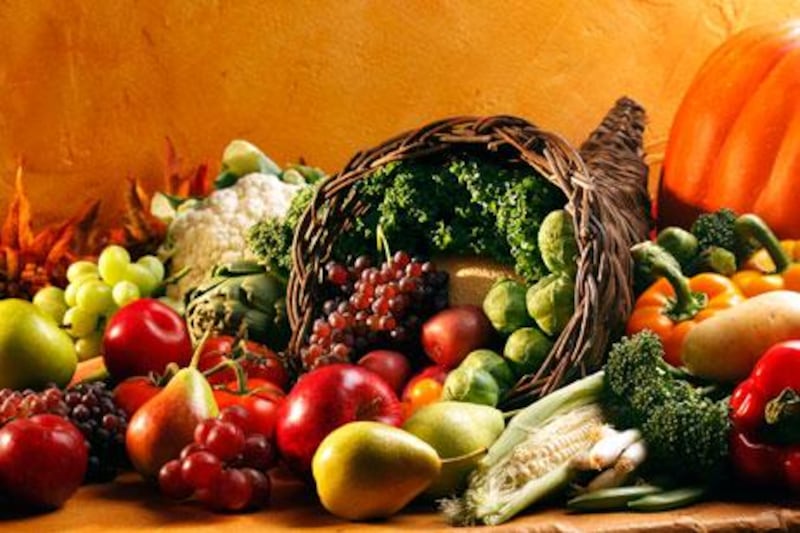In a part of the world where diet-related diseases such as diabetes have gained international notoriety, the health mantra of eating five pieces of fruit and vegetables a day would probably seem like a welcome campaign. But while some nutritionists insist a "five-a-day" plan is the way to go, other experts say it makes no difference in the battle against killer diseases.
In the UAE, the proliferation of easily available fried foods, a work ethic of long, desk-bound hours and a car-reliant culture have all contributed to the region's population recording the second highest diabetes rate in the world after the tiny island of Nauru, according to the International Diabetes Federation.
Ask any doctor what the fundamentals of a healthy diet are and they'll most likely recommend that you eat at least five portions of fruit and vegetables a day. "It's a concern among certain Middle East populations but less among others," says Caroline Kanaan, a Dubai-based dietitian with the Advanced Nutrition Centre (www.anc-dubai.com),whose job is to get Emiratis to adopt a healthy lifestyle to manage their cholesterol, diabetes and other health conditions. "We are lucky here in Dubai that most fruits and vegetables are abundantly available and very affordable. Most of the traditional diets of people living here are based on vegetables."
However, the influence of western diets and junk food, in particular, is having a worrying effect on the established healthy eating habits. The most recent UAE Ministry of Health figures show that about 77.5 per cent of males and 75.7 per cent of females eat fewer than five fruit and vegetable servings per day, below even the basic recommended amount and part of a general downwards trend in fruit and vegetable consumption over the past 20 years.
Of equal concern are the views of some of the world's leading health experts who now insist that even if we were to follow the advice of the five-a-day proponents, the effect it would have upon certain diseases would be negligible. A recent study into the eating habits and health implications in 400,000 test cases, presented as part of the European Prospective Investigation into Cancer and Nutrition (EPIC), says we're only scratching the surface with a five-a-day plan and what people really need to be eating is at least eight or nine portions of fresh fruit and vegetables a day - along with a major shift in their social and exercise habits - if they really want to avoid an early grave.
"The EPIC findings add further evidence that a broad effort to increase consumption of fruits and vegetables will not have a major effect on cancer incidence," revealed Dr Walter Willett, of the Harvard School of Public Health in Boston, when the study was released. Willett suggests that only when coupled with a concerted assault on other risk factors such as smoking and lack of exercise, would getting people to eat more fruit and vegetables make any impact.
The EPIC study looked at fruit and vegetable consumption across Europe. It found the average amount a person ate a day was around 335 grams of fruit and vegetables - about four portions - but that was the average. In countries where the heart disease and cancer scores were lowest (mainly Italy, Spain and Greece), people ate the most fresh produce - Italian men average 7.5 portions day and Spanish women 6.7 portions. In the UK, the average was four portions a day; in Scandinavia it was even lower.
"It's not the number that counts at all," says Caroline Kanaan. "It does not really work if you put both fruits and vegetables in the same group. If health authorities want to promote a message, it has to be more precise and applicable to the population. The healthy plate message, where half your meal is vegetables, is more effective."
Other nations are rethinking their healthy diet advice. In Japan, the recommended daily intake is now 850g, or 11 portions a day. In India, the official line is 720g or four portions of fruit, plus five portions of vegetables a day. In Canada, a 10-a-day split of fruit and vegetables is the recommended intake.
While critics point out that cost and availability of produce influence the take-up of healthy eating plans, there's also the matter of quality to consider. Not all fruit and vegetables are created equal, it seems, as the ANDI score - a nutrition ranking system developed in the US - suggests. The ANDI (Aggregate Nutrient Density Index) scores 1,000 different foods according to how rich they are in nutrients and antioxidants - chemicals in foods that nutritionists claim can protect the body's cells against diseases such as cancer.
Among the vegetables that pack the most punch, according to the ANDI score, are watercress, kale, bok choy, spinach and radishes - while red peppers, broccoli and bean sprouts appear in the top 20 most nutrient-packed vegetables.
Experts such as Kanaan insist that it's the imbalance of quality food that's the real problem.
"Emiratis do eat a lot of fruits, especially dates and they drink a lot of fruit juices." In her opinion, the five-a-day campaign isn't as relevant as simply facing the fact that more and more of us are overeating a more westernised diet. "I've seen locals with bowel and digestive problems and usually these are helped by having more water, eating less junk food and simply thinking about what's going on your plate - have two or three whole fruits a day and have vegetables at every meal."
For more information, visit www.tudiabetes.org






